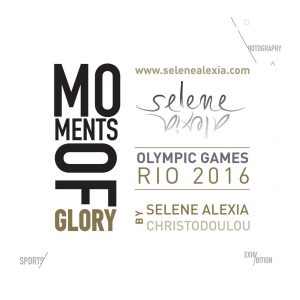 Our first Creative Inspiration is a memorable photographic exhibition focusing on the true “Moments of Glory†of the Olympic Games RIO 2016, captured by photographer Selene Alexia.
Our first Creative Inspiration is a memorable photographic exhibition focusing on the true “Moments of Glory†of the Olympic Games RIO 2016, captured by photographer Selene Alexia.
The exhibition showcased returning champions and first time victors from around the globe, including the “Angel with Iron Wings†and the fastest man alive.
With 100 photographs, featuring athletes from all over the world, the exhibition showed that gold is not the measure of all things. The effort, the dedication and the companionship are…
 Every athlete has a story to tell. And they are all glorious.
Every athlete has a story to tell. And they are all glorious.
The Olympics are arguably the biggest, most celebrated sporting event, offering athletes a chance to triumph with the entire world as their audience. They are a celebration of effort, diligent training, passion, will and the determination to not let anything hold you back.
“The important thing in life is not the triumph but the struggle. The essential thing is not to have conquered but to have fought well,†is what Baron Pierre de Coubertin, the founder of the modern Olympic games, envisioned for the sport.
Even in a world which promotes ‘winning at all costs’ there were moments in these games that truly reflect the ideals Baron Coubertin envisioned. Moments which show emotion and dedication. They show a world without discrimination. A world where ‘gold’ is not the measure of all things. The effort, the struggle and the companionship are.
These golden, glorious moments of the Olympics express something much more profound than results. They touch us deeply and have less to do with who won or who lost. They show the bonds that form even amongst the fiercest competitors, going beyond and ethnic, religious and cultural boundaries. Beyond politics. Beyond borders. They show the generosity of spirit and the glory of what it means to be human and to be good to the core.
These moments show people who are driven by their passion and the love of sport. Who try to exceed their own limits. Who try their best and may or may not win the gold but are all victors in their own right. They made it to the Olympics.
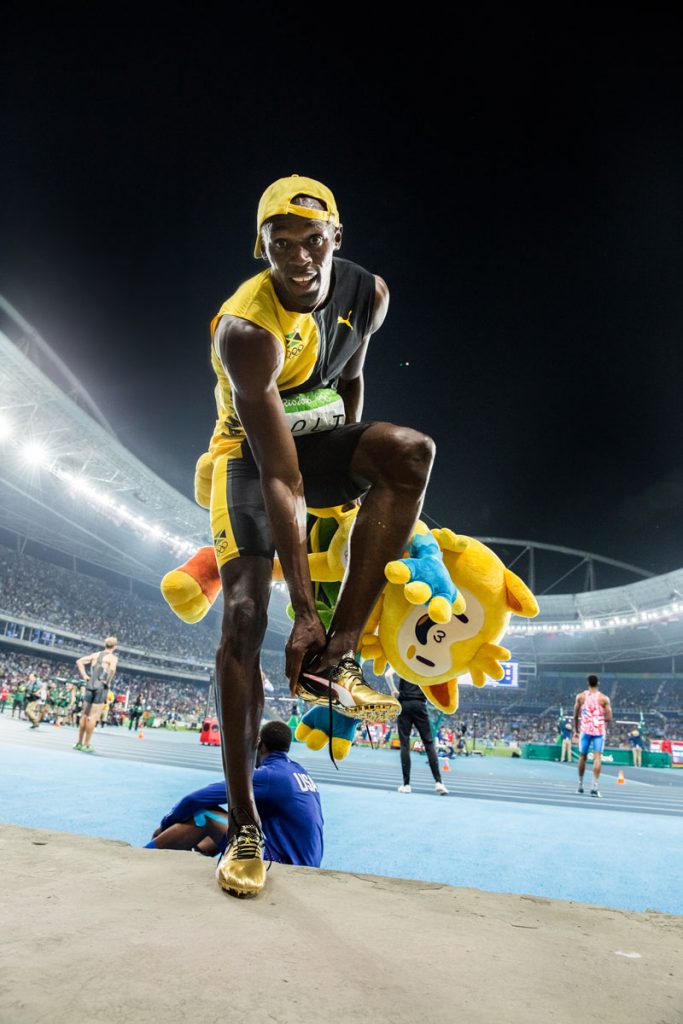 Consider Usain Bolt. He is the fastest man alive and regarded as the greatest sprinter of all time. Eight-time Olympic champion, eleven-time world champion. He holds the world and Olympic record for the 100m and 200m sprint.
Consider Usain Bolt. He is the fastest man alive and regarded as the greatest sprinter of all time. Eight-time Olympic champion, eleven-time world champion. He holds the world and Olympic record for the 100m and 200m sprint.
But beyond that, he is someone who loves his fans. After his 100m race, Bolt ran his victory lap cheered on by the crowds. As he was about to leave the stadium, the big group of Jamaican fans standing just behind me, started calling out his name, shouting and trying to get his attention. He heard them, even amongst the roar of the rest of the stadium and ran over. He came to a halt just in front of me and took off his shoes.
There was a moment of pause where no one realised what was happening, and I was able to shoot the champion as though it was a private photo session. But not two breaths later the calmness was shattered. His shoes were off, he stepped onto the rails of our stand and with a giant stride reached his fans who clung to him, snapping photos with their phones and getting autographs. After Bolt left the stadium the crowds died down. The stands began to clear. Fans were no longer paying attention to the athletes still competing in the field. Photographers wrapped up for the day.
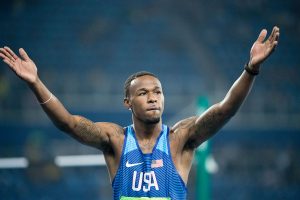 Ricky Robertson, a high jumper from the USA, had one more jump to try make it into the high jump finals. But no one was watching him. Tension weighed heavy on his shoulders. He raised his hands above his head and began to clap, trying to rouse the spectators from the isles. His fellow competitors joined in, clapping for him, cheering him on. The crowds took notice and began to clap too. He was ready to jump, to make that last attempt just before his time ran out.
Ricky Robertson, a high jumper from the USA, had one more jump to try make it into the high jump finals. But no one was watching him. Tension weighed heavy on his shoulders. He raised his hands above his head and began to clap, trying to rouse the spectators from the isles. His fellow competitors joined in, clapping for him, cheering him on. The crowds took notice and began to clap too. He was ready to jump, to make that last attempt just before his time ran out.
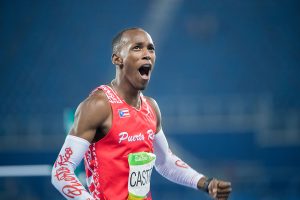 Luis Castro was one of his fellow high jumpers. After finishing his jumps, he started screaming and shouting, cheering with joy. At that moment he knew he didn’t make it to the finals, having missed his three attempts at 2.26m but he was beaming with joy none the less, proud to represent his country amongst the best of the world. He did qualify for the final though, along with three other athletes with the same performance as he did, in order to fill the 12 spots in the final round.
Luis Castro was one of his fellow high jumpers. After finishing his jumps, he started screaming and shouting, cheering with joy. At that moment he knew he didn’t make it to the finals, having missed his three attempts at 2.26m but he was beaming with joy none the less, proud to represent his country amongst the best of the world. He did qualify for the final though, along with three other athletes with the same performance as he did, in order to fill the 12 spots in the final round.
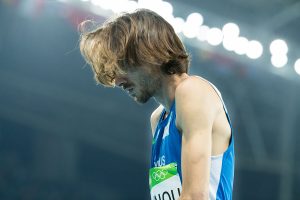 Kyriakos Ioannou was also one of those three high jumpers who made it to the finals. He was calm before his last jump, concentrating on his goal. He took part in the three Olympic games before Rio with the dream of qualifying to the final, which he made a reality in these games.
Kyriakos Ioannou was also one of those three high jumpers who made it to the finals. He was calm before his last jump, concentrating on his goal. He took part in the three Olympic games before Rio with the dream of qualifying to the final, which he made a reality in these games.
Pavlos Kontides is the only Cypriot to ever win an Olympic medal. In 2012 he became the pride of the country winning the silver in Laser Sailing. He won silver in the 2013 world championships and has had a remarkable career both before and after 2012. He, like most sailors taking part, struggled with the conditions during the Rio games.
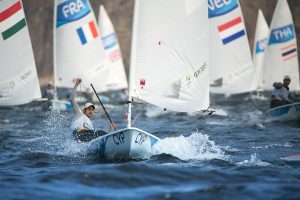 The polluted waters of the Guanabara bay made many athletes ill. The winds posed a challenge, dying down for hours keeping the sailors on land just waiting for the flag which would allow them to go compete, building up tension and breaking mental preparation. And he was the golden boy of the country. All the pressure, the difficult conditions, an error in judging the winds and tides lead to him placing 7th in the games. But the games are about more than the gold. They are about the effort, mutual respect and the refusal to give up. Kontides did the best he could, pushing himself as hard as possible in every single race. And he didn’t give up, just because he didn’t win. Not a year later he became world champion.
The polluted waters of the Guanabara bay made many athletes ill. The winds posed a challenge, dying down for hours keeping the sailors on land just waiting for the flag which would allow them to go compete, building up tension and breaking mental preparation. And he was the golden boy of the country. All the pressure, the difficult conditions, an error in judging the winds and tides lead to him placing 7th in the games. But the games are about more than the gold. They are about the effort, mutual respect and the refusal to give up. Kontides did the best he could, pushing himself as hard as possible in every single race. And he didn’t give up, just because he didn’t win. Not a year later he became world champion.
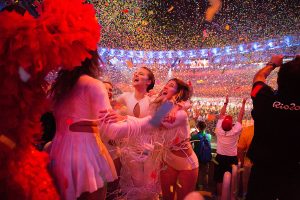 The Rio Olympics were a bright escape in a conflicted year, which did not quite go as expected. The city was politically, financially and socially unstable, under repeated terror threats and with the zika virus filling visitors with fear. Ticket sales were low, infrastructure was delayed. A doping scandal hurt the ideals of the Olympics… the games seemed destined to be a disaster.
The Rio Olympics were a bright escape in a conflicted year, which did not quite go as expected. The city was politically, financially and socially unstable, under repeated terror threats and with the zika virus filling visitors with fear. Ticket sales were low, infrastructure was delayed. A doping scandal hurt the ideals of the Olympics… the games seemed destined to be a disaster.
But instead they exemplified what every Olympic Games show: unity and Optimism in Sport. Athletes and officials, press and spectators gathered in this lively city to celebrate the triumphs and challenges that make up these games. Hundreds of thousands of people came together to make this spectacle unique from the first song heard at the opening ceremony to the last fireworks of the closing ceremony.
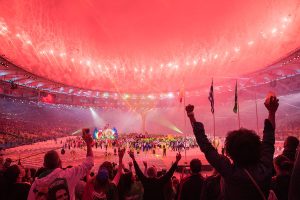 Without meaning to paint a false picture, as not every moment during these games was ideal, under the Olympic anthem people came together. For just over two glorious weeks sport brought together people from all over the globe, from every culture, every religion and every walk of life, and championed them all as individuals. For the first time in history ten athletes competed under the Olympic flag as part of the refugee Olympic team. These people are a symbol of hope in a war-torn world. Yursa Mardini is one of them. She was born in Syria. Her home was destroyed during the civil war and she and her sister fled not a year before the Rio games.
Without meaning to paint a false picture, as not every moment during these games was ideal, under the Olympic anthem people came together. For just over two glorious weeks sport brought together people from all over the globe, from every culture, every religion and every walk of life, and championed them all as individuals. For the first time in history ten athletes competed under the Olympic flag as part of the refugee Olympic team. These people are a symbol of hope in a war-torn world. Yursa Mardini is one of them. She was born in Syria. Her home was destroyed during the civil war and she and her sister fled not a year before the Rio games.
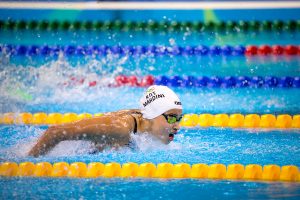 They travelled to Lebanon, then Turkey and arranged passage to Greece on a small boat that was meant to carry six people, with eighteen other souls. They left their country and family behind, left land and set off against the waves of the Aegean. The motor stopped working and the boat began taking on water. Mardini, her sister and two other men were the only ones who knew how to swim. They jumped into the water and pushed the boat for over three hours until they carried all on board to safety, reaching the island of Lesbos.
They travelled to Lebanon, then Turkey and arranged passage to Greece on a small boat that was meant to carry six people, with eighteen other souls. They left their country and family behind, left land and set off against the waves of the Aegean. The motor stopped working and the boat began taking on water. Mardini, her sister and two other men were the only ones who knew how to swim. They jumped into the water and pushed the boat for over three hours until they carried all on board to safety, reaching the island of Lesbos.
She was 17 years old at the time. At 18 she was allowed to compete in the Rio games, beside other athletes who no longer have a nation they can call home. Because of politics, these people who trained diligently for years, perhaps decades, would not be allowed to compete, but that changed in Rio. Here she was allowed to make her dream of reaching the Olympics a reality, in spite of the turmoil rife in the rest of the world.
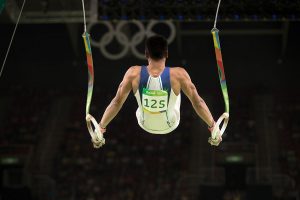 Marios Georgiou is the first artistic gymnast to qualify for the Olympic games for Cyprus. His passion for the sport is evident from the first moment he steps into the arena, smiling and bouncing from foot to foot. Not only did he make it to the Olympic games, but he qualified for the men’s individual all-round final, joining the elite of this incredibly challenging sport. But during training a day before the final he broke his ankle. He did not give up.
Marios Georgiou is the first artistic gymnast to qualify for the Olympic games for Cyprus. His passion for the sport is evident from the first moment he steps into the arena, smiling and bouncing from foot to foot. Not only did he make it to the Olympic games, but he qualified for the men’s individual all-round final, joining the elite of this incredibly challenging sport. But during training a day before the final he broke his ankle. He did not give up.
He competed in the finals in spite of the pain. He tumbled down gripping his ankle after landing his jump on the vault, the first apparatus of his rotation. He took a breath and performed on the parallel bars, doing flips and turns in the air but once more tumbling during the landing, his pain obvious on his face. He moved on to the high bar and withdrew from competition just before the floor. He wouldn’t let an injury steal the spotlight and stop him from living his dream.
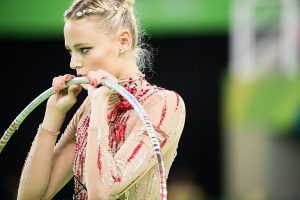 Yana Kudryavtseva is known as the “angel with iron wings†for her passion and strong will. She is the youngest rhythmic gymnast to win the world championships in the all-around at 15 and remained on the podium throughout her career. She was in the lead for the gold medal in the first and second rotation, performing beautifully with both the hoop and ball. In the last second of her third rotation though she dropped one of her clubs during her finishing move.
Yana Kudryavtseva is known as the “angel with iron wings†for her passion and strong will. She is the youngest rhythmic gymnast to win the world championships in the all-around at 15 and remained on the podium throughout her career. She was in the lead for the gold medal in the first and second rotation, performing beautifully with both the hoop and ball. In the last second of her third rotation though she dropped one of her clubs during her finishing move.
The gold slipped through her fingers. But she kept her composure, a feat which not many athletes or people are capable of to such a degree, knowing her dream of winning an Olympic gold would never become a reality. She performed beautifully with the ribbon and secured the silver, hugging and cheering on her teammate, Margarita Mamun, who won the gold.
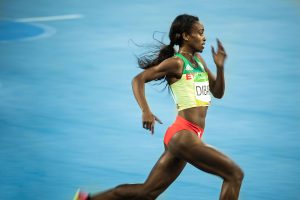 Genzebe Dibaba has two older sisters, Tirunesh who has won six Olympic medals, three of which were gold, and Ejegayehu who won a silver in the 2004 Athens Olympics. She also has a brother who is an athlete and a cousin who also won three Olympic medals. She ran in her first Olympic games in Rio hoping to set her own mark on the family legacy and managed to win the silver medal. She is currently the holder of eight world records, the most world records held simultaneously by an athlete in history and is considered the greatest female miler ever.
Genzebe Dibaba has two older sisters, Tirunesh who has won six Olympic medals, three of which were gold, and Ejegayehu who won a silver in the 2004 Athens Olympics. She also has a brother who is an athlete and a cousin who also won three Olympic medals. She ran in her first Olympic games in Rio hoping to set her own mark on the family legacy and managed to win the silver medal. She is currently the holder of eight world records, the most world records held simultaneously by an athlete in history and is considered the greatest female miler ever.
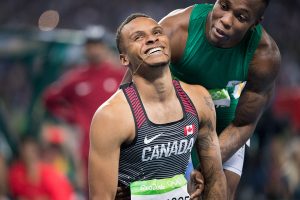 Andre De Grasse is another remarkable sprinter who won the silver medal in the 200m, and the bronze in the 4x100m relay and in the 100m. He passed the finish line with a time of 9.91s and sat down, resting his head on the ground. He looked up at the screen to see how he did when Akani Simbine of South Africa came over to congratulate him. De Grasse was so happy he won the bronze even though he was only 0.02s behind Justin Gatlin of the USA, who won the silver.
Andre De Grasse is another remarkable sprinter who won the silver medal in the 200m, and the bronze in the 4x100m relay and in the 100m. He passed the finish line with a time of 9.91s and sat down, resting his head on the ground. He looked up at the screen to see how he did when Akani Simbine of South Africa came over to congratulate him. De Grasse was so happy he won the bronze even though he was only 0.02s behind Justin Gatlin of the USA, who won the silver.
Milan Trajkovic of Cyprus competed in the first heat of the 110m hurdle race. The athletes stepped out onto the track and warmed up. They were introduced by the commentators and as they took their places on the starting blocks torrential rain broke out. Everyone in the stadium was fleeing for cover and soaked through within seconds. The blue track turned into a slippery sea.
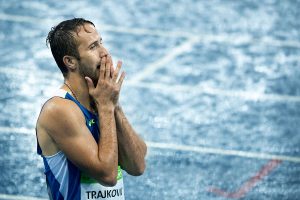 But the race went on as planned. He jumped the first hurdle but hit the second one, shattering it with his knee, the pieces scattering all over the track. He jumped the third, stumbled on the fourth, and on another and another, crossing the finish line. He ran with all his might and thought he didn’t make it. He was frustrated, full of emotion. Then looked up at the screen to see just how badly he performed, and his hands fell to his mouth in disbelief. He made it, qualifying for the semi-finals and then making it to the finals, placing 7th and joining the hall of Olympians.
But the race went on as planned. He jumped the first hurdle but hit the second one, shattering it with his knee, the pieces scattering all over the track. He jumped the third, stumbled on the fourth, and on another and another, crossing the finish line. He ran with all his might and thought he didn’t make it. He was frustrated, full of emotion. Then looked up at the screen to see just how badly he performed, and his hands fell to his mouth in disbelief. He made it, qualifying for the semi-finals and then making it to the finals, placing 7th and joining the hall of Olympians.
These were some of the ‘Moments of Glory’ behind the exhibition held first in Cyprus in May 2017 and then in London in June 2018.
Source:Â Selene Alexia



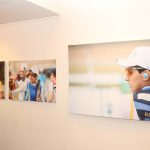
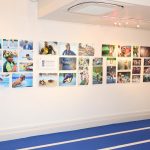
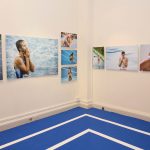
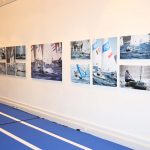


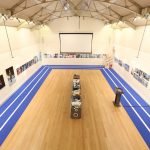
You must be logged in to post a comment Login